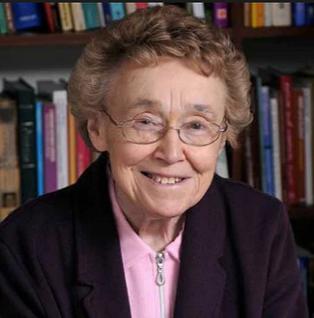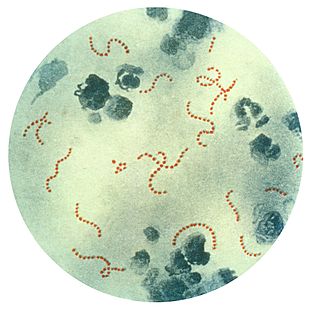Related Research Articles

Asperger syndrome (AS), also known as Asperger's syndrome, formerly described a neurodevelopmental disorder characterized by significant difficulties in social interaction and nonverbal communication, along with restricted and repetitive patterns of behavior, interests, and activities. The syndrome has been merged with other disorders into autism spectrum disorder (ASD) and is no longer considered a stand-alone diagnosis. It was considered milder than other diagnoses that were merged into ASD due to relatively unimpaired spoken language and intelligence.

Tourette syndrome or Tourette's syndrome is a common neurodevelopmental disorder that begins in childhood or adolescence. It is characterized by multiple movement (motor) tics and at least one vocal (phonic) tic. Common tics are blinking, coughing, throat clearing, sniffing, and facial movements. These are typically preceded by an unwanted urge or sensation in the affected muscles known as a premonitory urge, can sometimes be suppressed temporarily, and characteristically change in location, strength, and frequency. Tourette's is at the more severe end of a spectrum of tic disorders. The tics often go unnoticed by casual observers.

Lorna Gladys Wing was an English psychiatrist. She was a pioneer in the field of childhood developmental disorders, who advanced understanding of autism worldwide, introduced the term Asperger syndrome in 1976 and was involved in founding the National Autistic Society (NAS) in the UK.
Pervasive developmental disorder not otherwise specified (PDD-NOS) is a historic psychiatric diagnosis first defined in 1980 that has since been incorporated into autism spectrum disorder in the DSM-5 (2013).
Childhood disintegrative disorder (CDD), also known as Heller's syndrome and disintegrative psychosis, is a rare condition characterized by late onset of developmental delays—or severe and sudden reversals—in language, social engagement, bowel and bladder, play and motor skills. Researchers have not been successful in finding a cause for the disorder. CDD has some similarities to autism and is sometimes considered a low-functioning form of it. In May 2013, CDD, along with other sub-types of PDD, was fused into a single diagnostic term called "autism spectrum disorder" under the new DSM-5 manual.

Echolalia is the unsolicited repetition of vocalizations made by another person. In its profound form it is automatic and effortless. It is one of the echophenomena, closely related to echopraxia, the automatic repetition of movements made by another person; both are "subsets of imitative behavior" whereby sounds or actions are imitated "without explicit awareness". Echolalia may be an immediate reaction to a stimulus or may be delayed.
High-functioning autism (HFA) was historically an autism classification where a person exhibits no intellectual disability, but may experience difficulty in communication, emotion recognition, expression, and social interaction.

Pediatric autoimmune neuropsychiatric disorders associated with streptococcal infections (PANDAS) is a controversial hypothetical diagnosis for a subset of children with rapid onset of obsessive-compulsive disorder (OCD) or tic disorders. Symptoms are proposed to be caused by group A streptococcal (GAS), and more specifically, group A beta-hemolytic streptococcal (GABHS) infections. OCD and tic disorders are hypothesized to arise in a subset of children as a result of a post-streptococcal autoimmune process. The proposed link between infection and these disorders is that an autoimmune reaction to infection produces antibodies that interfere with basal ganglia function, causing symptom exacerbations, and this autoimmune response results in a broad range of neuropsychiatric symptoms.
Stereotypic movement disorder (SMD) is a motor disorder with onset in childhood involving restrictive and/or repetitive, nonfunctional motor behavior, that markedly interferes with normal activities or results in bodily injury. To be classified as SMD, the behavior in question must not be due to the direct effects of a substance, autism, or another medical condition. The cause of this disorder is not known.
Causes and origins of Tourette syndrome have not been fully elucidated. Tourette syndrome is an inherited neurodevelopmental disorder that begins in childhood or adolescence, characterized by the presence of multiple motor tics and at least one phonic tic, which characteristically wax and wane. Tourette's syndrome occurs along a spectrum of tic disorders, which includes transient tics and chronic tics.

Classic autism, also known as childhood autism, autistic disorder, (early) infantile autism, infantile psychosis, Kanner's autism,Kanner's syndrome, or (formerly) just autism, is a neurodevelopmental condition first described by Leo Kanner in 1943. It is characterized by atypical and impaired development in social interaction and communication as well as restricted, repetitive behaviors, activities, and interests. These symptoms first appear in early childhood and persist throughout life.
Susan Swedo is a researcher in the field of pediatrics and neuropsychiatry. Beginning in 1998, she was Chief of the Pediatrics & Developmental Neuroscience Branch at the US National Institute of Mental Health. In 1994, Swedo was lead author on a paper describing pediatric autoimmune neuropsychiatric disorders associated with streptococcal infections (PANDAS), a controversial hypothesis proposing a link between Group A streptococcal infection in children and some rapid-onset cases of obsessive-compulsive disorder (OCD) or tic disorders such as Tourette syndrome. Swedo retired from the NIH in 2019, and serves on the PANDAS Physician Network.
Ami Klin is an American psychologist who studies autism. He is the first chief of autism and related disorders at the Marcus Autism Center, a wholly owned subsidiary of Children’s Healthcare of Atlanta. Klin will also be a Georgia Research Alliance Eminent Scholar at Emory University and director of the Division of Autism and Related Developmental Disabilities in the Department of Pediatrics at the Emory University School of Medicine.

Autism, formally called autism spectrum disorder (ASD) or autism spectrum condition (ASC), is a neurodevelopmental disorder marked by deficits in reciprocal social communication and the presence of restricted and repetitive patterns of behavior. Other common signs include difficulties with social interaction, verbal and nonverbal communication, along with perseverative interests, stereotypic body movements, rigid routines, and hyper- or hyporeactivity to sensory input. Autism is clinically regarded as a spectrum disorder, meaning that it can manifest very differently in each person. For example, some are nonspeaking, while others have proficient spoken language. Because of this, there is wide variation in the support needs of people across the autism spectrum.
Donald Jay Cohen was an American psychiatrist, psychoanalyst, and director of the Yale Child Study Center and the Sterling Professor of Child Psychiatry, Pediatrics and Psychology at the Yale School of Medicine. According to the New York Times, he was "known for his scientific work, including fundamental contributions to the understanding of autism, Tourette's syndrome and other illnesses, and for his leadership in bringing together the biological and the psychological approaches to understanding psychiatric disorders in childhood"; his work "reshaped the field of child psychiatry". He was also known as an advocate for social policy, and for his work to promote the interests of children exposed to violence and trauma.
James Frederick Leckman is an American child psychiatrist and psychoanalyst and the Neison Harris Professor of Child Psychiatry, Psychiatry, Psychology and Pediatrics at the Yale School of Medicine, recognized for his research in Tourette syndrome (TS) and obsessive–compulsive disorder (OCD).
Fred Robert Volkmar is a psychiatrist, psychologist, and the Irving B. Harris Professor of Child Psychiatry, Pediatrics, and Psychology at the Yale School of Medicine. From 2006 to 2014, he was the director of the Yale Child Study Center and the head of child psychiatry at Yale New Haven Hospital. Prior to these appointments, he was the director of the Autism Program at the Yale Child Study Center since 1983.

Edward Ross Ritvo was an American psychiatrist known for his research on genetic components of autism. He was a professor emeritus of UCLA's Neuropsychiatric Institute.
Valsamma Eapen is a chair of infant, child and adolescent psychiatry at UNSW Sydney. She is a fellow of the Royal Australian and New Zealand College of Psychiatrists, and the Royal College of Psychiatrists, UK.
Rhea Paul is an American clinical language scientist known for her work in the field of speech-language pathology. She was Founding Chair in the Department of Speech-Language Pathology in the College of Health Professions at Sacred Heart University and a research scientist and affiliate of Haskins Laboratories at Yale University.
References
- ↑ Yale Child Study Center Receives Over $3.5 Million NIH Grant For Autism Research, Medical News Today, Jan 27, 2007
- ↑ Welcome from Director, Fred R. Volkmar, MD, Yale Child Study Center website, accessed April 15, 2012
- ↑ Yale Child Study Center Receives Over $3.5 Million NIH Grant For Autism Research, Medical News Today, January 27, 2007.
- ↑ Welcome from Director, Fred R. Volkmar, MD, Yale Child Study Center website. Retrieved April 15, 2012.
- 1 2 Yale Child Study Center History. Retrieved April 15, 2012.
- ↑ van Schalkwyk, Gerrit Ian (2017), "Fred R. Volkmar", in Volkmar, Fred R. (ed.), Encyclopedia of Autism Spectrum Disorders, New York, NY: Springer, pp. 1–2, doi:10.1007/978-1-4614-6435-8_102162-1, ISBN 978-1-4614-6435-8 , retrieved May 31, 2023
- ↑ "Linda Mayes' journey to leading the Child Study Center". medicine.yale.edu. Retrieved May 31, 2023.